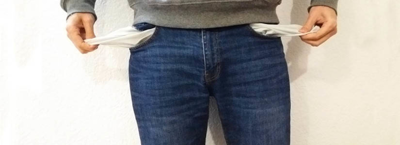
Being in debt can be a nightmare. And keeping track of your debt can lead to sleepless nights worrying if you’ve missed a payment or overlooked a debt you owe.
At Salad Money we know how difficult managing finances can be for our frontline NHS workers and those key workers in general. One forgotten debt could put your financial resilience at risk. If you have lost track then you need to find out who you owe money to, and fast. Missed payments could affect your credit rating, making it harder to get credit in the future.
In this article we’ll look at two questions “who do I owe money to?” and “how to find out who I owe money to”. Finding out more about your debts will put you in a much better position to start taking control.
What types of debt can be easily missed?
Some debts are easy to overlook:
- Store cards or catalogue debts
- Unpaid parking tickets
- Unsecured loans including payday loans
- Overdrafts
- Student loans
- Benefits overpayments
Debts like parking tickets and store card debt are easy to miss if you don’t deal with them fast or you haven’t visited the shop in a while. But just because the consequences of not paying these non-priority debts are less serious, it doesn’t mean that you should ignore them.
So how do you find out who you owe money to? There are plenty of easy to use options that can help you establish exactly what you owe and whether you’re responsible for the debt.
Check your credit file
Start by checking your credit file. You can do this online and it's the easiest way to find out what debts you have. You can also access information about:
- Your bank accounts
- Your loans
- Your credit and other cards
You can also find out public information about insolvency and County Court Judgments (CCJs). In the UK this information is held by three agencies - Experian, Callcredit and Equifax. You can access your information through the following websites:
- C1 Experian
- Credit Karma from Callcredit
- Clearscore from Equifax
These services are all free to use online. If you need a paper copy contact the agencies - there may be a small fee for this service.
Check emails from creditors
If you don’t have an online and offline filing system, now’s the time to start. You should go through all your emails and letters to check for important information on your debts.
If you’ve changed address recently and didn’t tell your creditors then you’ll need to contact your landlord or the new occupiers to find out if any important mail has been delivered from one of the people you owe money to. Leave a forwarding address for any mail that may arrive in the future.
Contact creditors
Once you’ve found out who you owe money to, you could contact your creditors directly to find out more information about the debt. You could explain to them that you’re trying to get on top of your debts. You could also ask them for a breathing space while you get more help and advice on managing the money you owe.
You could find that your debt has been sold on to a debt collection company. They will now control the debt and will be responsible for collecting it. You can try and find out more details from the original creditor - they should have a record and be able to give you details of the company that is now in charge of the debt.
Check your bank statements
If you handle most of your payments via Direct Debit or standing orders then you should go through your bank statement with a fine-tooth comb. Online banking apps let you search for specific payments or times of the year so you can pinpoint any debts you may have forgotten about.
Start by looking at any cancelled Direct Debits as this could give you a clue about any payments you’re missing.
Check your Student loan balance
You can manage your student loan balance online by signing in at Gov.uk. You’ll be able to check your balance and see how much you’ve repaid of your student loan or nurse’s bursary. You can also change your contact details or change your Direct Debits.
To sign in you’ll need the following details:
- Email address or customer reference number
- Password
- Secret answer e.g. first pet’s name
If you don’t know them you can reset your details using the email you used to apply for your student loan.
Check government departments
If you owe debts to the CSA, HMRC, or DWP as a result of benefit overpayments you’ll need to contact the right government department directly:
- HMRC will deal with tax credits and child benefit plus any taxes and duties you may owe which can be paid online
- Use the Local Council finderto get in touch about arrears in your council tax bill
- If you owe money to the CSA you can manage your payments online - you should contact them if you’re having trouble paying
- It’s easy to overlook benefit overpayments but you will be contacted by letter to repay the money - follow the information on how to make a repayment
- The DWP deal with Universal Credit and any repayments that may need to be made
Check that you're responsible for the debt
If you’ve tracked down your overlooked debt, it can seem daunting. But before you start making plans to repay it, take a few minutes to work out whether you’re responsible for the debt or not. You could find that there are some debts that you don’t need to pay.
You might not have to pay if:
- You were pressured into signing an agreement or it wasn’t clear what you were signing up for
- The creditor didn’t make the proper checks that you could afford to repay the debt
- It’s been six years or more since you were in contact with the creditor or made a repayment
There are other circumstances where you might not be liable for paying a debt.
If your debt is in joint names, you need to check that the other person has admitted in writing that the debt is theirs. You might also try and find out when they last made a payment. If one of you contacts the creditor the six year limit will be reset for that person. If either of you makes a payment the six years is reset for both of you.
If you were an additional cardholder, the card company can only demand repayment from the main cardholder.
If you’re under 18, then you can’t be held responsible for a debt if it’s for a day to day necessity. This could include clothes, food or a mobile phone contract.
Fair loans to help you manage your debts
If you’re a key worker trying to get on top of your debts, there is another way. A fair, affordable loan from Salad Money could improve your financial resilience and help you manage those overlooked debts.
We use Open Banking to assess your ability to repay, which means your loan application won’t affect your credit score. If you want to take control of the debts that got away, apply now. If you’re successful, the money will be in your account the next day.



